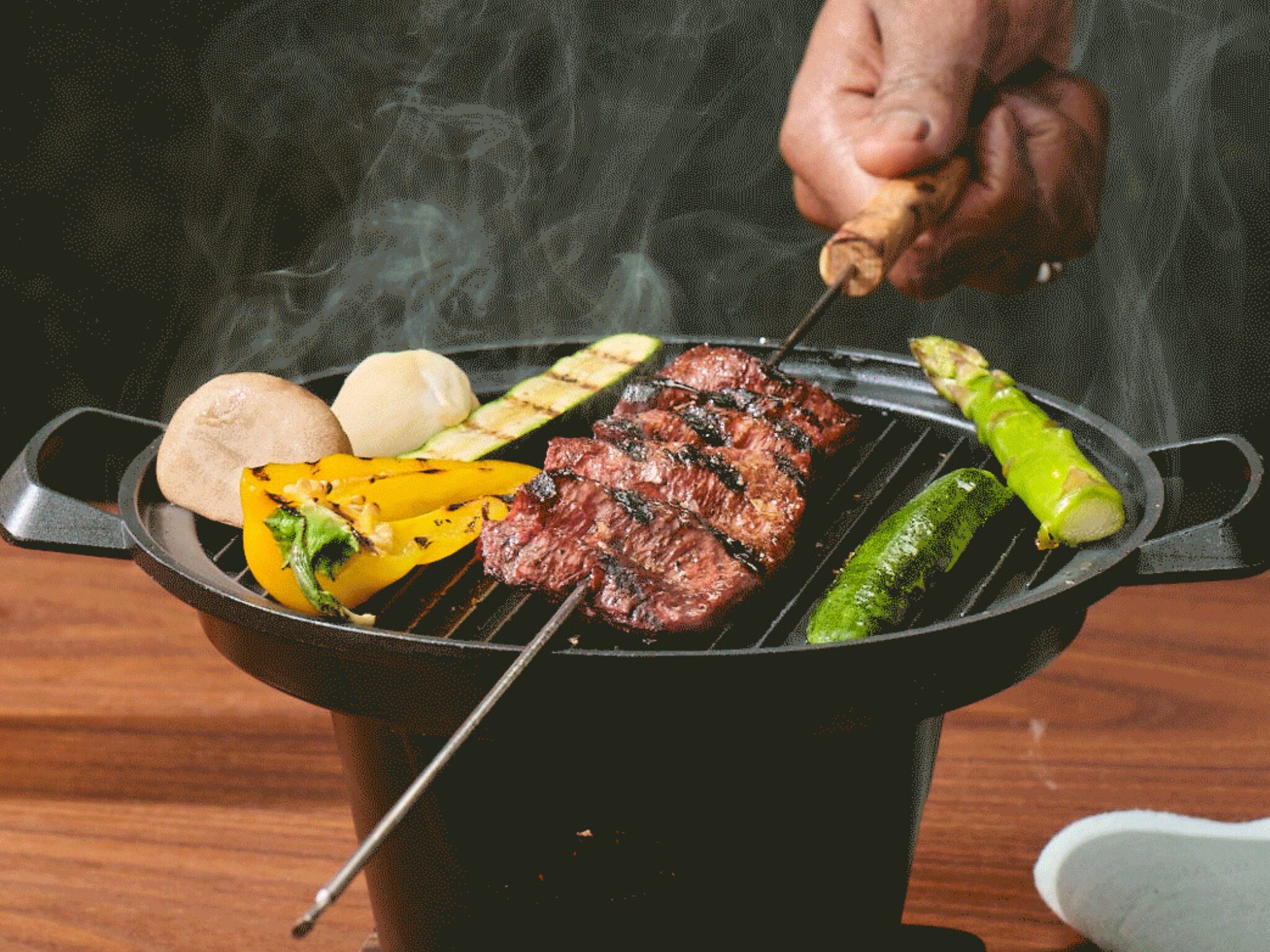Aleph Farms: Israel Awards the World’s First Regulatory Approval for Cultivated Beef
9 Mins Read
Israeli cultivated meat producer Aleph Farms has received the world’s first regulatory approval for cell-cultured beef, marking a milestone in the alternative protein sector.
This makes Israel – still in the middle of regional conflict – only the third country to greenlight cultivated meat, paving the way for Aleph Farms to introduce its Black Angus Petit Steak to diners soon.
Israel’s Aleph Farms has become the first company in the world to earn regulatory approval for cultivated beef, after the Israeli Ministry of Health (IMOH) issued a ‘no questions’ letter for its consumer brand Aleph Cuts in December – akin to an FDA ‘No Questions’ letter in the US. It allows the producer to market its products – currently priced similarly to premium conventional beef – in the country, with plans to roll out at restaurants and, eventually, retailers.
With the greenlight, Israel joins a very short list of countries to allow the sale of cultured meat – only Singapore (Eat Just in 2020) and the US (Upside Foods and Eat Just in 2023) have done so. But these approvals were all done for cell-based chicken products, meaning Aleph Farms is the first company permitted to sell cultivated beef.
“This announcement marks a critical leap in the global race to make the meat that people love, that’s also better for our climate, biodiversity, and food security,” said Bruce Friedrich, founder and president of alternative protein think tank the Good Food Institute (GFI). “We’re thrilled consumers in Israel will soon join those in the US and Singapore as being among the first to be able to purchase these delicious products.”
In a statement sent to Green Queen, Robert E Jones, president of Cellular Agriculture Europe and co-founder of the Global Cellular Agriculture Alliance, said: “I have sent heartfelt congratulations to our member company, Aleph Farms, on this exciting news. It is great to see more geographies approve cultivated meat and, equally important, to see more types of cultivated animal proteins entering the market. Israel, the Netherlands, Singapore, the United States, and the UK have made early investments to build complementary protein ecosystems, and the dividends are now paying off.”
Aleph Farms’ cultured meat costs the same as premium beef

The decision brings an end to a process a year-and-a-half in the making, when Aleph Farms filed its initial submission to the health ministry, following a pre-submission consultation. The company worked closely with the Food Risk Management Department, led by co-founder Dr Ziva Hamama, to ensure “full compliance with safety standards” for these novel proteins.
“This regulatory approval grants us permission to produce and market our product in Israel, subject to specific directions for labelling and marketing provided by the Israeli Ministry of Health, and the completion of Good Manufacturing Practices inspection for our pilot production facility,” explained Yifat Gavriel, the company’s regulatory affairs chief.
The first product to be unveiled is Aleph Farms’ cultivated thin-cut Petit Steak, which was first introduced in April with the Aleph Cuts brand. The hybrid meat product comprises non-modified, non-immortalised cells of a premium Black Angus cow named Lucy, alongside a plant protein matrix made of soy and wheat. Apart from the starter cells derived from one of the cow’s fertilised eggs, there are no other animal-sourced components (such as fetal bovine serum, or FBS) in the cultivation process or final product.
The controlled and traceable process is carried out in an aseptic production environment, which – the company states – increases transparency and significantly reduces contamination risks. Plus, there’s no presence of antibiotics in the process.
Once the requirements mentioned above (labelling and mark-of-facility inspection) are fulfilled, it will introduce Aleph Cuts to diners, offering exclusive tasting experiences curated in collaboration with select partners. “At first, the product will be available in select restaurants,” Yoav Reisler, senior marketing and communications manager at Aleph Farms, told Green Queen. “Afterwards, it will become available at foodservice and retail locations.”
On the cost question, he revealed: “At the time of our soft launch, Aleph Cuts will be priced similarly to premium conventional beef. We are taking various steps to drive economies of scale and achieve price parity with more of the conventional beef market within a few years from launch.”
No doubt, making it a hybrid product helps too, as this is the path some envision cultivated meat to enter the market (Dutch producer Meatable is taking this approach too). “Hybrid products will allow the cultivated market the chance to build and become normalised with consumers, while also – importantly – generating the revenues and business necessary to keep dollars flowing into the space, so scale can be further achieved,” one alt-protein investor told Green Queen in December.
Cultured meat needs to reach production costs of $2.92 per pound to be price-competitive with conventional meat. But while companies have managed to cut manufacturing costs by 99% in less than a decade, McKinsey analysis estimates that it will still take until 2030 for these proteins to reach parity. “Of common animal proteins, beef delivers the highest value in global markets, so by focusing on cultivated beef, we are able to shorten the timeline to price parity,” explained Reisler.
Israel’s need – and support – for cultivated meat

“The entire Aleph team has united in strength and determination to deliver no matter what during these difficult times in Israel. We are excited to carry this resilience forward in the form of innovation in agriculture and food security,” said Aleph Farms co-founder and CEO Didier Toubia.
It’s a milestone for a country that has long been supportive of alternative proteins – and for good measure, given the nation’s battle with food insecurity: government figures show that 16% of Israeli families and 21% of children did not have adequate access to safe, nutritious food in 2021. Among families with children, 19% experienced food insecurity, and 8.5% suffered from severe insecurity.
As cultivated meat doesn’t rely on livestock agriculture, huge swathes of farmland, or vast amounts of water, the benefits are as important for climate change as they are for food security. This is especially true for beef, which emits more greenhouse gas emissions than any other foodstuff. It’s a meat loved by Israelis, who eat 19.6kg of it per year and are expected to consume over 29kg annually by 2029.
But uniquely, Israel is known to be one of the most vegan-friendly countries in the world. According to a 2017 survey (the latest data available), 5% of its citizens identify as vegans and 8% as vegetarians. At the same time, 23% expressed a desire to cut their intake of meat.
This explains Israel’s support for alternative proteins, which “stands out globally”, according to Alla Voldman, VP of strategy and policy at GFI Israel. “Three out of the first eight cultivated meat companies worldwide are Israeli. 15% of global investments in the field are allocated to Israeli-cultivated meat companies,” she noted.
This ecosystem includes the world’s largest cultivated meat consortium, which Aleph Farms is a part of. A three-year project to scale up production and drive down costs of cultivated meat, it received funding to the tune of 66 million NIS ($18M).
“We believe that the robust presence of cultivated meat companies, fermentation, and plant-based, coupled with advanced academic research, entrepreneurship, industry, and unique consumer market, provide Israel with an opportunity to lead the field forward,” Voldman added. “This strengthens our ability to provide value to countries worldwide in an era of climate and food security crises.”
Toubia added: “We believe that addressing joint challenges like food security is the best way to ensure the prosperity of the Middle East and other parts of the world that rely heavily on massive food imports, especially in Asia.”
But the incidence of veganism be a catalyst for the success of a fellow alt-protein pillar in cultivated meat? “I’m not sure it’s one of the most significant markers,” Reisler said. “Aleph Cuts are animal-based products, as the original source of animal cells is a cow. However, many vegetarians and vegans may call Aleph Cuts vegetarian-friendly and vegan-friendly, as the product is not harvested from an animal carcass and there is no slaughter involved in the production.” [As noted above, the starter cells for Aleph Farm’s beef steaks are sourced from the fertilised eggs of a cow, and as such, cultivated meat isn’t usually regarded as vegan-friendly – for an ethical take, this is a good read.]
What’s next for Aleph Farms after regulatory approval?

Aleph Farms’ regulatory approval in Israel is a huge win – but it isn’t stopping there. The company has filed for clearance in Singapore, Switzerland, the UK and the US, and is advancing its applications in other markets too. “Entrance to Asia (via Singapore) and the Middle East (via Israel) is currently our main focus. We expect to receive positive indications from the Singapore Food Agency soon,” confirmed Reisler.
Pressed on the progress with these applications – particularly in the UK, as there is talk about a bilateral deal to fast-track approval for Aleph Farms – he told Green Queen: “We maintain a dynamic, ongoing channel of communication with those regulatory agencies as part of our review process. They have been receptive in regard to our production and process development, and have shown appreciation for our methodological science-based approach to ensuring the safety of our process and product.”
The company is simultaneously pursuing a kosher certificate for its facility from local rabbinate authorities too. This is key for a company based in Israel and catering to a large Jewish population, which eats kosher food as directed by the Torah. There are encouraging signs for Aleph Farms here, with Israel’s chief rabbi David Lau declaring last January that its non-FBS steak could be considered kosher and akin to eating a vegetable (parve).
As it awaits decisions from other regulators globally, its approval in Israel could be a precursor for things to come. “2024 stands to be a landmark year for the advancement of regulatory pathways and commercialisation of cultivated meat,” claimed Gavriel.
Meatable is expecting a green light for its cultivated pork from Singapore this year, and France’s Vital Meat claims it’s the frontrunner to be the first European startup to be approved in the city-state. Meanwhile, Australia’s Vow Food is in the middle of a consultation process after its cultured quail was cleared as safe to eat by the bilateral Food Standards Australia New Zealand in December.
“There’s still work ahead of us to continue to scale up, meet consumer expectations and move toward the mainstream. However, I think on the technology side, the scientific side, in terms of process development, early industrialisation and regulatory compliance, we have made a huge leapfrog, and I’m quite happy to see that,” Toubia told Green Queen founding editor Sonalie Figueiras on the Green Queen in Conversation: Cultivated Meat Pioneers podcast in September. “The industry is really on the verge of going to market and starting initial acceptance.”
Following a $105M Series B round in 2021, Aleph Farms has raised a total of $118M in funding – Toubia has outlined the company’s aim to reach $1B in revenue by 2030. This will be helped by its manufacturing advancements over the last couple of years. In February 2022, it moved to a 65,000 sq ft plant in Rehovot, Israel, which increased its capacity by six times to be able to initially produce 10 tonnes of cultivated steak annually. Last year, it announced the acquisition of another manufacturing facility in Modi’in, Israel, alongside a new manufacturing agreement with ESCO Aster in Singapore (the world’s only approved industrial manufacturer for cultured meat).
“With its global leadership in cellular agriculture, Israel continues to push for greater regional integration and economic collaboration, which will be crucial for stabilising the region,” said Toubia. “We believe that addressing joint challenges like food security is the best way to ensure the prosperity of the Middle East and other parts of the world that rely heavily on massive food imports, especially in Asia.
“Now more than ever, Aleph Farms remains committed to making the world a better place.”




